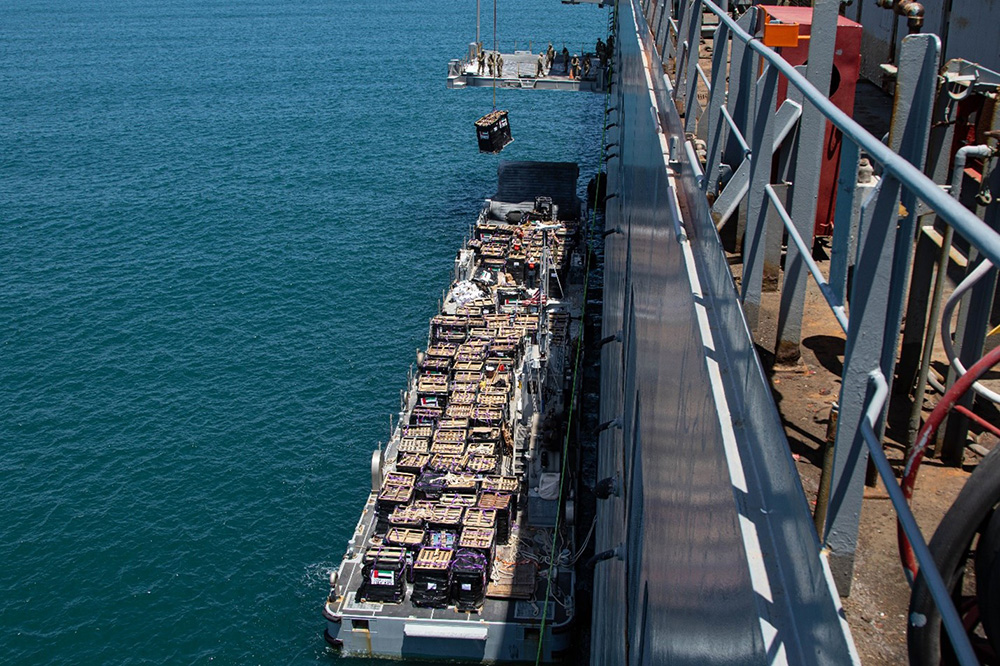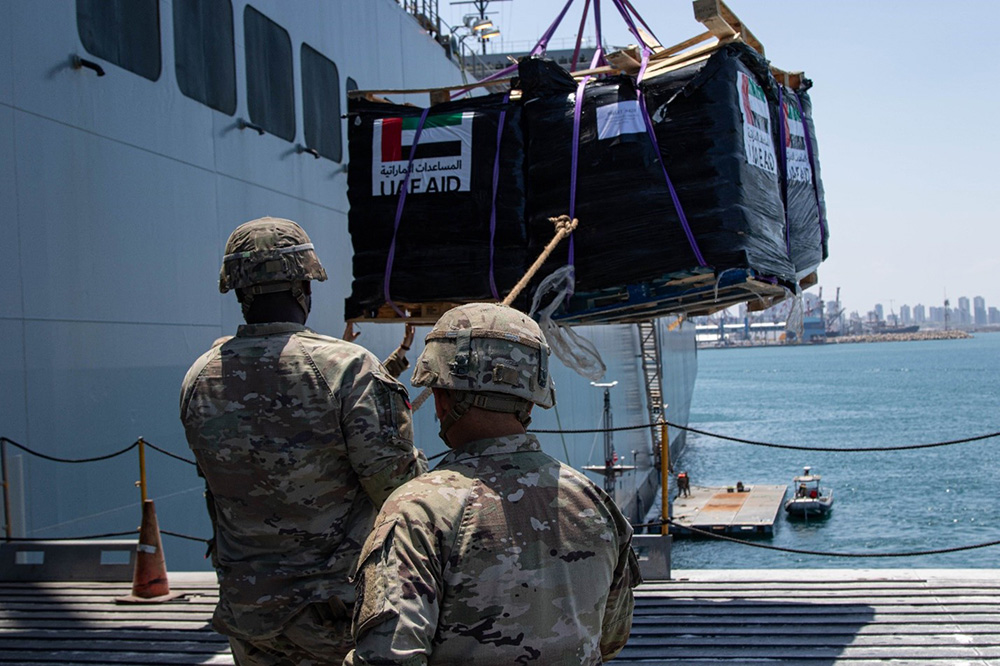The Joint Logistics, Over-the-Shore humanitarian aid corridor is in place in Gaza and will shortly begin funneling supplies to civilians in the region, U.S. Agency for International Development and U.S. Central Command officials said on Thursday.
Sonali Korde of USAID’s Bureau for Humanitarian Assistance said the Defense Department logistics capability stands ready to deliver aid to Palestinians in Gaza. Korde and Navy Vice Adm. Brad Cooper, the deputy commander of Centcom, briefed the media on the operation.
Korde said the maritime option is anchored on the Gaza shore and ready to begin delivering aid. “This is necessary because of the absolutely dire conditions in Gaza,” she said. “Conditions on the ground have not improved and in the past two weeks. We have seen a vital border crossing close and a supply decline at a time when it is critical.”
The maritime corridor is one more tool to get aid to Gaza’s 2.2 million people. Korde said the entire population is facing acute food insecurity. “I want to underscore just how dire this is for the most vulnerable, particularly mothers and children, and that is who we are particularly focused on reaching with our assistance,” she said. “As humanitarian needs continue to skyrocket, the United States is working tirelessly to surge assistance through all available means to address the impacts of this crisis.”
Getting food to those affected is not enough. The Palestinians in Gaza also need “nutritional treatments, clean water and support for health care workers to reach mothers and children and prevent a further deterioration of the humanitarian situation,” she said. “We need to ensure that the most vulnerable have access to the systems they need and alleviate their suffering.”

Soldiers use a crane to load humanitarian aid for civilians in Gaza. These soldiers are supporting the construction of the Joint Logistics Over-the-Shore system off the shore of Gaza. © Army Staff Sgt. Malcolm Cohens-Ashley
President Joe Biden ordered DOD to emplace the Joint Logistics, Over-the-Shore capability — commonly called JLOTS — in March. The capability is now operational, Cooper said, and international aid should soon start reaching those in need.
The pieces for the temporary floating pier “were loaded aboard ships on the East Coast of the United States, transported 6,000 miles across the ocean, and principally assembled off the coast of Gaza,” Cooper said.
Final assembly was in the Israeli port of Ashdod. “This morning — just a few hours ago — the pier was successfully affixed to the beach in Gaza, and in the coming days we will commence the delivery of aid,” he said.
About 1,000 U.S. soldiers and sailors were instrumental in delivering and building this capability. “Fourteen U.S. and partner nation ships of various sizes are solely focused on this one mission,” Cooper said.
The process for getting supplies to Gaza will begin in Cyprus. Humanitarian assistance will arrive in Cyprus via air or sea. The assistance will be screened and then palletized for delivery. These pallets will be loaded onto large commercial and military vessels. Those vessels will sail to a large floating platform anchored several kilometers off the coast of Gaza. “This loading platform acts as a stable workspace to translate pallets from the larger commercial ships on the smaller U.S. military vessels that can reach closer to shore,” Cooper said.

U.S. Army soldiers with the 7th Transportation Brigade (Expeditionary) use a rope to stabilize humanitarian aid while it is lifted by a crane aboard the MV Roy P. Benavidez at the Port of Ashdod, Israel. © Army Staff Sgt. Malcolm Cohens-Ashley
The smaller ships carry between five and 15 trucks to a floating causeway where they will drive to a marshalling yard on shore. “The United Nations will oversee receipt of humanitarian aid for onward distribution inside Gaza,” Cooper said.
He added that as of today, there is a large amount of aid on ships in the Eastern Mediterranean ready for delivery. Cooper stressed that the pier the trucks will use has only one purpose: to deliver humanitarian assistance to the people in Gaza. “This maritime route is additive and is not meant to replace land routes into Gaza,” he said. “This is an internationally backed effort coordinated with the United Nations. The U.S. military is simply providing logistics support to enable international donors to flow their aid into Gaza from the sea and set a different way.
“As a point of emphasis, this is a 100% humanitarian mission,” Cooper continued. “Any attack on those working on it is an attack on aid for the people of Gaza.”
He also reiterated that there will be no U.S. military boots on the ground in Gaza.





